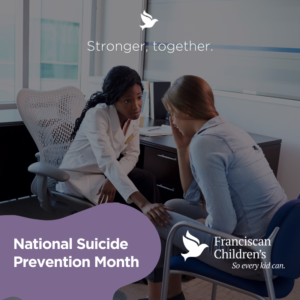Back to School 2021: Weathering the Storm Together to Prevent Suicide

Blog is written by: Anna Lingan, CWI School-Based Therapist |Site Manager for Winship Elementary School, and Jane Carper, CWI School-Based Therapist | Site Manager for Higginson Lewis School.
At the start of the summer, many of us were hopeful that we would be returning to “normal,” or closer to what life felt like pre-COVID-19 at the start of the 2021-22 school year. Now that we are at the beginning of the new school year, we find ourselves still in the midst of an ongoing pandemic. With the new Delta variant and the coinciding return to school it makes sense that we are feeling just as much (if not more) anxiety and uncertainty than we did a year ago.
When asked how they are feeling about going back to school, many of the students we work with through the Children’s Wellness Initiative (CWI) at Franciscan Children’s have expressed mixed emotions, explaining that they feel both “excited” and “scared.” Many students are excited to see their friends and teachers, but at the same time worry about getting sick or being around big groups of people again. Others have expressed they feel self-conscious about physical changes, such as weight gain, that may have occurred over the last 18+ months.
That is why it is especially important to exercise more compassion and patience for yourself and others during this school year. Self-awareness will be crucial in identifying our needs and areas of discomfort or anxiety. The COVID-19 pandemic is not over; it is an ongoing, constant stressor. We are all still weathering this storm.
September not only means the start of a new school year but also National Suicide Prevention Month. The effects of the COVID-19 pandemic are likely to exacerbate already existing risk factors for suicide. Boston Children’s Hospital documented a 47% increase in kids needing to be hospitalized for suicidal thoughts or suicide attempts between July and October of 2020, compared to the same period the year before.[1] This trend has unfortunately continued into 2021.
This year, it is crucial that clinicians, school staff, and caregivers work together to prevent suicide. While the return to in-person learning may lead to increased anxiety and stress, clinicians and educators will need to be more aware of students’ social and emotional well-being. As clinicians and behavioral health professionals who work in schools with children and adolescents, it is important for us to continue to pay special attention to warning signs and risk factors for suicide. It will be essential for us to understand how the pandemic has and continues to impact our kids individually. Warning signs may include feelings of hopelessness, isolation or withdrawal from social supports and typical interests, changes in sleep and eating patterns, and changes in mood. School staff should especially note if these signs continue beyond the initial transition back to school. Clinicians and school staff have a bigger responsibility this year for communicating closely about any warning signs or risk factors they notice in their students. School staff should also take a strong initiative in communicating with parents and caregivers, and check in with students on a constant basis about how they are feeling.
As clinicians and educators who hold space for our children’s anxieties and experiences, it is also important that we do the same for ourselves and each other. Self- and collective care will be even more important as we return to school and aim to support our students during this significant transition. We are in a powerful position to model healthy coping skills and communication as we navigate our own experiences and reactions to school re-entry amidst the ongoing pandemic.
Blog is written by: Anna Lingan, CWI School-Based Therapist |Site Manager for Winship Elementary School, and Jane Carper, CWI School-Based Therapist | Site Manager for Higginson Lewis School.
Resources: You can reach the National Suicide Prevention Lifeline at 1-800-273-TALK (8255).
En español: 1-888-628-9454; deaf and hard of hearing: dial 711, then 1-800-273-8255.
Contact the Samaritans Statewide Hotline (call or text) at 1-877-870-HOPE (4673).
Call2Talk can be accessed by calling Massachusetts 211 or 508-532-2255 (or text c2t to 741741).
[1] The Pandemic Left More Kids Feeling Suicidal. One Mass. Teen Found Her Way Out Of The Dark. (June 2021). www.wbur.org. https://www.wbur.org/news/2021/06/21/massachusetts-suicidal-thoughts-kids-children-covid
View All Blog Stories